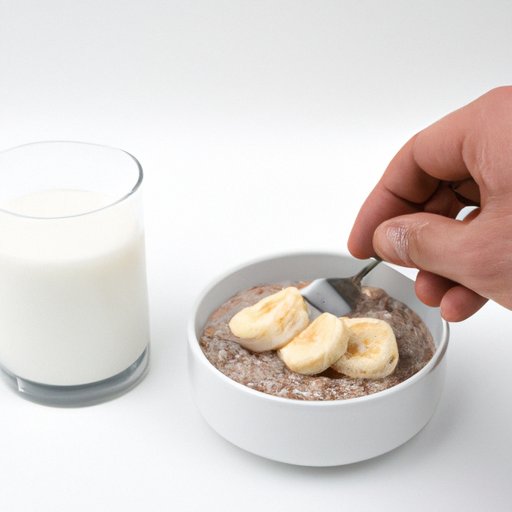
Introduction
Are you experiencing constipation while consuming protein? Many people who are trying to increase their protein intake often wonder if protein may be causing their constipation. In this article, we will explore the relationship between protein intake and constipation, as well as offer solutions for preventing digestive issues while still enjoying the benefits of protein.
The Relationship Between Protein Intake and Constipation: What You Need to Know
Protein is a vital nutrient that plays many essential roles in our body. It is responsible for building and repairing tissues, producing enzymes, hormones, and other chemicals, and contributes to many important bodily functions. On the other hand, constipation is a common digestive problem that affects many people. It is characterized by infrequent bowel movements, difficulty passing stools, and hard or lumpy stools.
So, what is the relationship between protein intake and constipation? Research suggests that protein intake may contribute to constipation by reducing the water content in the stool, leading to harder and more compact feces that can be difficult to pass. However, this effect is not consistent across all individuals and may depend on several factors such as protein source, overall diet, and individual health status.
In general, too much protein intake can lead to constipation as well as other digestive problems, while too little protein intake can affect essential bodily functions. Finding the right balance is crucial for maintaining digestive health and overall wellbeing.
Feeling Stuck? The Truth About Protein and Constipation
While protein intake may contribute to constipation, several factors can affect bowel movements and lead to digestive issues. A low-fiber diet is one of the leading causes of constipation. Fiber adds bulk to the stool, making it easier to pass. If your diet is low in fiber, increasing your intake may help improve bowel movements. Dehydration is another common cause of constipation. Without proper hydration, the stool can become dry and compact, leading to difficulty passing it.
In addition, while protein supplements can be a convenient way to increase protein intake, they can also contribute to constipation and other digestive problems. Whey protein, for example, is a common ingredient in protein shakes and can cause digestive issues such as bloating and constipation. Consuming protein supplements in moderation and drinking plenty of water can help prevent these issues.
How Your Protein Shake Could Be Causing Digestive Issues
Protein shakes are a convenient way to increase protein intake, but they may also contain ingredients that can cause digestive issues. Artificial sweeteners, for example, can disrupt the balance of gut bacteria and cause bloating and other digestive problems. Similarly, sugar alcohols such as xylitol and sorbitol can cause diarrhea and gas, leading to discomfort and digestive issues. If you are experiencing constipation or other digestive problems while consuming protein shakes, it may be helpful to switch to whole food sources of protein.
Protein and Digestion: A Closer Look at Common Misconceptions
There are many common misconceptions surrounding protein and digestion. One of the most persistent myths is that protein is harder to digest than fats and carbs. However, research suggests that protein is not harder to digest, but rather, it may take longer to digest than other macronutrients. Another common misconception is that plant-based proteins are inferior to animal-based proteins. However, many plant-based protein sources are high in fiber, vitamins, and minerals, making them an excellent choice for digestive health.
The gut microbiome, a term used to describe the community of microorganisms that live in our digestive system, is another area of interest when it comes to protein and digestion. Emerging research suggests that protein may have a significant impact on the gut microbiome, and an imbalance in gut bacteria can lead to digestive problems and other health issues.
Protein’s Digestive Impact: Conquering Constipation
So, how can you prevent constipation while still enjoying the benefits of protein? The key is to choose protein sources that are high in fiber. Animal-based proteins such as chicken, turkey, and fish, as well as plant-based proteins such as legumes, nuts, and seeds, are excellent sources of protein and fiber. In addition, staying hydrated and getting regular physical activity can help improve bowel movements and prevent constipation.
If you are experiencing constipation despite consuming adequate fiber and protein, probiotics and digestive enzymes may be beneficial. Probiotics are live bacteria that can help improve gut health, while digestive enzymes can aid in breaking down nutrients and improving digestion.
Is Your High-Protein Diet to Blame for Chronic Constipation?
While protein is a vital nutrient, a high-protein diet may contribute to chronic constipation and other health issues. Research suggests that consuming too much protein can lead to dehydration, which can affect digestion and elimination. In addition, consuming large amounts of animal-based proteins, especially red meats, has been linked to an increased risk of colorectal cancer and other health problems.
If you are looking to incorporate more protein into your diet, it may be helpful to speak to a nutritionist or doctor to discuss the best approach for your individual needs.
The Pros and Cons of Protein: Understanding the Link to Constipation
Overall, protein plays an essential role in our body, but consuming too much or too little can lead to digestive issues and other health problems. Choosing protein sources that are high in fiber, staying hydrated, and getting regular physical activity can help prevent constipation and other digestive issues. It is also important to consume protein in moderation and speak to a healthcare professional before making any significant changes to your diet.
Conclusion
Protein is an essential nutrient that plays many important roles in our body. While protein intake may contribute to constipation, it is not the only factor that affects digestion and elimination. By choosing protein sources that are high in fiber, staying hydrated, and getting regular physical activity, you can prevent constipation and enjoy the benefits of protein. Speak to a healthcare professional if you are experiencing chronic constipation or have any concerns about your diet and digestive health.




